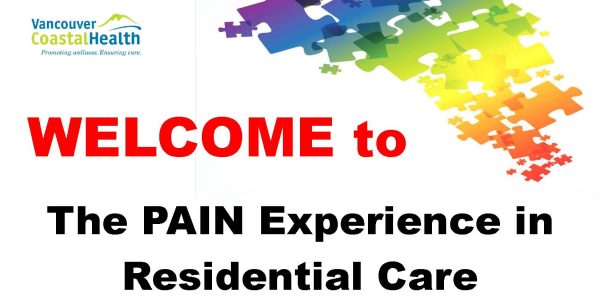Uncomplicating the language of pain
“Pain has no common language. Our residents may tell us they are experiencing pain through words, but sometimes they tell us through their actions, or behaviours. Our challenge, as caregivers, is to uncomplicate the language of pain, and understand what our residents are telling us.” – Leanne Kemp, RN
Every year, CIHI (Canadian Institute for Health Information) reports out on 9 Quality Indicators for Residential Care.
One of the reported indicators is the experience of pain, which is an indicator that VCH performs below both the Canadian and Provincial rate. While that performance has shown some improvement over the last 2 years, further improvement is needed.As a result the VCH Residential Quality Practice Council has been the driver to improve that performance – improve quality of life for frail elders living in VCH Residential Care sites.
The initiative
Members of the Residential Practice Team, with project lead Leanne Kemp have developed and implemented “The PAIN Experience in Residential Care.” A foundational interactive education session delivered to almost 400 VCH residential care staff over the past eight months, focused on improving the experience of pain in frail older adults in Residential Care. In the education session, the Residential Practice Team focused on addressing the challenge to meet the pain-related needs of residents who have limited communication abilities, with an emphasis on the belief that quality of life must prevail no matter the stage of life.
The PAIN Experience education sessions were delivered to all disciplines within 36 residential care teams, and included some of VCH’s rural sites by partnering with UBC and Telehealth. Participants learned about various aspects of pain, from examining personal values, through to assessment tools, understanding the complexity of pain in dementia, and both non-pharmacological and pharmacological approaches to pain management. Through the education sessions, the team was also able to link this work with other initiatives focused on person-centred care, including EPAIRS and the Dementia Care Initiative. With the initial roll-out completed earlier this month, which has created a buzz throughout the world of residential care, the PAIN initiative work will continue through site specific education and support.

